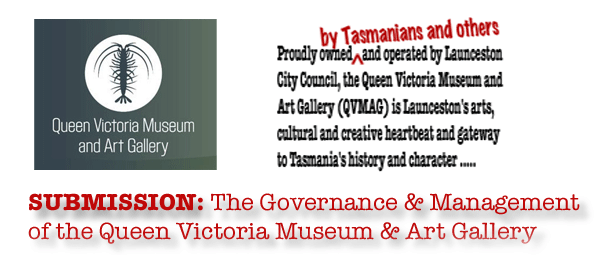
This submission is set against the background of the recent failures and weaknesses that have exposed themselves in the operation of the Queen Victoria Museum and Art Gallery (QVMAG). The malfunctions that led to the dismissal of the Museum’s Director are self-evident.
- The concept that the QVMAG is “owned by Launceston City Council” (LCC) is debateable and contested.
- It is held that there are known failures and weaknesses of governance at the QVMAG.
- It is also held that the LCC has virtually abdicated it representational role in respect to the QVMAG and handed policy making to management.
- 4. It is considered evident that the LCC has broken the chain of accountability in respect to the QVMAG.
The Immediate Situation: The LCC’s General Manager has embarked upon a hasty course of action that pays little if any attention to governance matters and is about to appoint a new Director:
- Without there being a either a clear mission/purpose, goals or current Strategic Plan;
- There cannot be a comprehensive Duty Statement for the Director to follow,and with further risks that;
- The qualifications and the domain knowledge of those engaged in the recruitment process are not known;
- and consequently invites the same failures of focus and accountability that occurred previously.
Against a background of recalcitrance by the elected Aldermen in addressing the QVMAG’s lack of clear mission/purpose and goals, management has no guidance to align future activities with community goals and aspirations. Given the failures that can be attributed to a similar course of action in the past this appears to be both inappropriate and imprudent – contrary to the LCC motto.
A Productive Way Forward: Since LCC presents as being unwilling to reform the QVMAG as an institution by addressing the weaknesses and failures in its governance, it would seem that there is a need to provide the Council with a stimulus to do so. This submission calls for the appointment of an independent Commissioner, or group of Commissioners, with appropriate domain knowledge. The Commissioner's role would be to oversee:
1. The ongoing short-term – 6 to 9 mths – operation of the QVMAG;
2. The preparation of a Strategic and a Marketing Plan for the QVMAG;
3. The preparation of an appropriate short term business cum enterprise plan including a determination of whether the museum can be operated as an income generation centre instead of the current ‘cost centre’ approach;
4. The auditing of the QVMAG’s operations and management structure;
5. The preparation of ongoing quality assurance benchmarks;
6. A consultation process with the Community of Ownership and Interest;
7. The recruitment of a standalone Board of Governors/Trustees;
8. The recruitment of a Director, or a Directorate, for the QVMAG;
9. The implementation of change management within the institution;
10. A review of the institutions funding mechanisms –Local, State, Federal Govt. plus other income generation options.
In short all the evidence points to there being a bureaucratic experiment in progress and one that flies in the face of recent experience. We submit that the appointment of a Commissioner/s as set out above seems to be the only way forward that shows any promise of an equitable outcome for the QVMAG’s current staff, ratepayers, taxpayers and the institution’s Community of Ownership and Interest.
Furthermore, we submit that the State Government has cause to review the level of recurrent funding for the QVMAG and call upon LCC to be truly accountable for the sound operation of the QVMAG.




